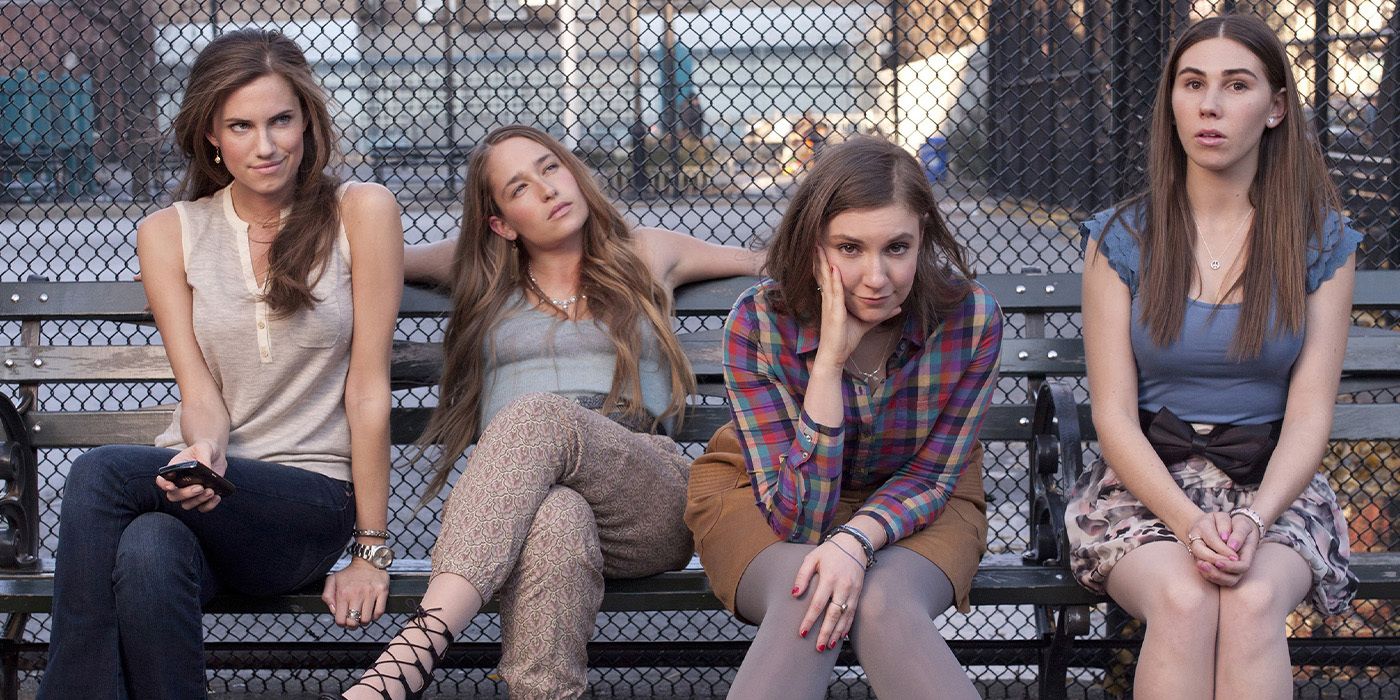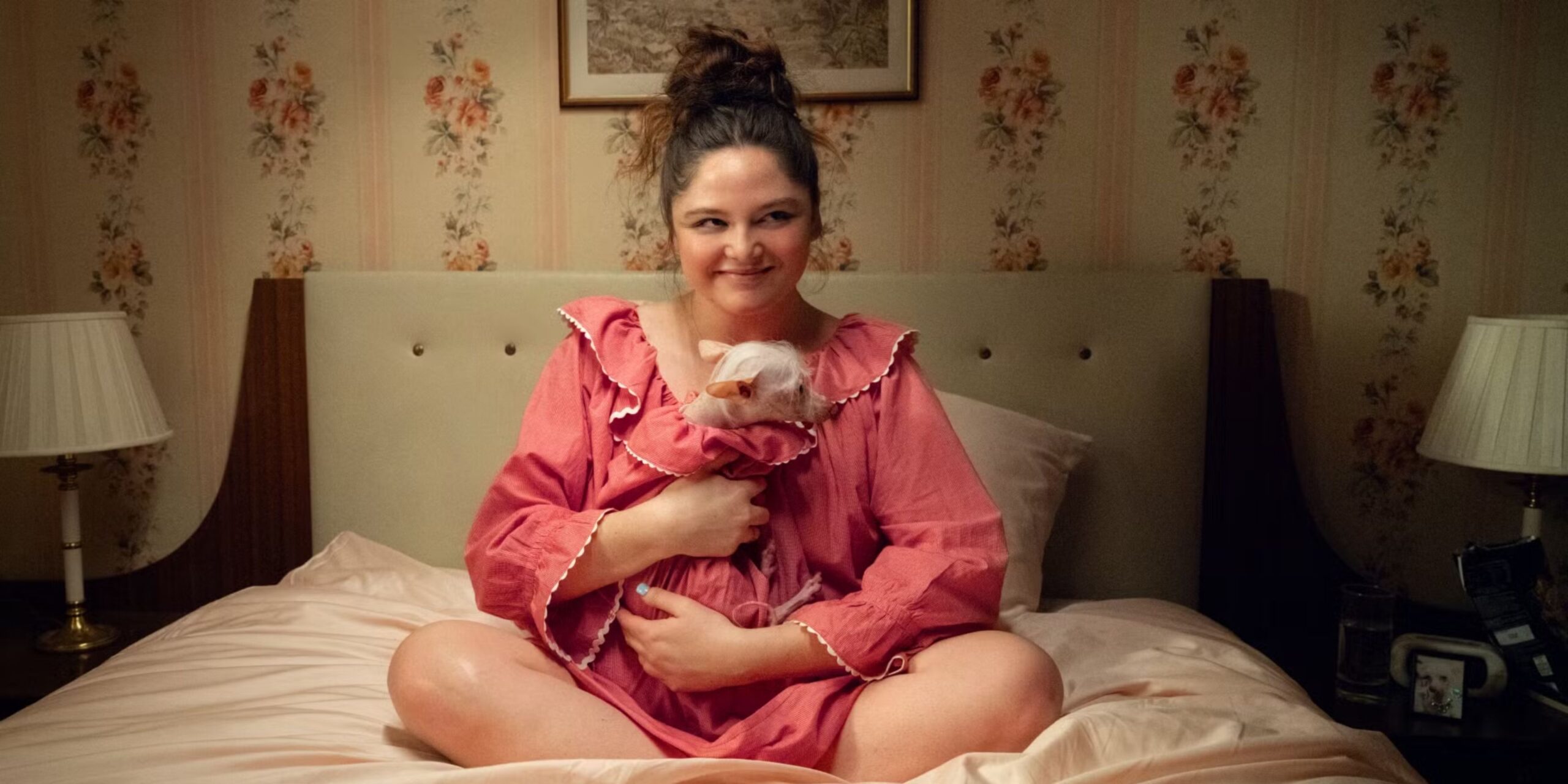It’s been seven years since Lena Dunham last navigated the TV space, where she thrived with the HBO series Girls. The mix of Dunham’s self-deprecating humor and the relatable yet annoying characters driving the show drew viewers in, especially those caught up in the messiness of early adulthood. In her grand return to the episodic format, Dunham has once again crafted a series that inspects the hardships of the coming-of-age experience, this time through a more digital lens. Unresolved trauma, body image, and influencer culture are all central themes in Too Much, a Netflix 10-part series that will make you swoon and roll your eyes in equal measure.
What Is ‘Too Much’ About?
Led by Hacks alum Megan Stalter, Too Much follows a New Yorker who is spiraling after getting dumped by her boyfriend of seven years. Jessica’s way to cope with the pain is by recording confessional videos of herself addressed to her ex’s new partner (an influencer played by model Emily Ratajkowski). Struggling to move on, Jessica accepts an offer to fly to London for work and soon finds the cure to her heartbreak in Felix (Will Sharpe), a tormented indie musician. It doesn’t take long for their fling to become something more, with the characters’ insecurities and their pasts coming back to haunt them and, in turn, directly interfering with their evolving connection.
Loosely based on Dunham and her husband Luis Felber‘s real-life romance (with the latter credited as co-creator), Too Much gets it right about love being complicated. Jessica and Felix both have their fair share of baggage that they are bringing into their newly minted relationship, and that leads them to go from 0 to 100 several times. Their chaotic and fragile bond is what anchors the series, especially when its comedic elements miss the mark. At its best, Too Much offers a candid portrait of modern dating and the challenges of coming to terms with trauma. At its worst, the series loses its charm when it deviates from the main pair to focus on side characters and celebrity cameo appearances that detract rather than add to the story.
In the Netflix original’s first episode, Jessica is in the living room with her sister, mother, grandmother, and nephew watching Ang Lee‘s Sense and Sensibility. That classic moment where Edward (Hugh Grant) professes his affections for Elinor Dashwood (Emma Thompson) is what leads the protagonist to wish for love straight out of a Jane Austen novel. Although her idealized notions of romance are set in a pastoral England, the meet-cute that awaits her is in the bathroom of a London pub, with Felix asking her for toilet paper in the adjacent stall. A far-from-glamorous introduction only goes to show that love can appear in the most unexpected places.
Stalter and Sharpe are the rom-com duo we didn’t know we needed in Too Much. From their very first scene together, you can’t help but root for Jessica and Felix. Even though the actors’ chemistry is what convinces you that the characters are meant to be, Dunham’s writing is what allows for their budding romance to have the build-up necessary to keep you hooked. Episode 3 is particularly irresistible, set on a sleepless night with the main characters watching films, having candid conversations in bed, fooling around, and uttering the most swoonworthy lines that could give Nobody Wants This a run for the money. Throughout the series, we get to know them both on a deeper level, uncovering the root of Jessica’s inability to forget her ex-boyfriend and Felix’s constant need to morph into whatever setting he is in to feel like he belongs.
Too Much also excels in showcasing Jessica’s experience with culture shock. As an American whose sole knowledge of London is based on pop culture references, the main character soon realizes that her bold personality and sense of humor clash with her British colleagues and social circle, who prioritize composure and tradition in public settings. Even though Felix is captivated by her authenticity, their respective cultural upbringings affect their relationship head-on, especially given that Felix doesn’t mind adjusting himself to be aligned with the places and people he is with.

Related
This ‘Girls’ Star, 39, Claims the Break She Took From Acting Was “Intentional”
“When the show ended, I didn’t know what direction to move in.”
Dunham’s ‘Too Much’ Is Better When It Focuses on Its Deeper Themes
Despite Jessica and Felix’s romantic arc elevating the series and paving the way for insightful discussions about its central themes, Too Much tries so hard to be funny that it crosses into humorless territory. Jessica’s interactions with her co-workers come off as cringe rather than hilarious, and her two forays into drugs lead to some of the most exhausting turn of events in the show. In fact, the supporting cast (except for Jessica’s family) isn’t fully-fledged or interesting enough to keep you invested when they appear, as opposed to the main pair.
Cameo appearances from the likes of Kit Harington, Jessica Alba, Andrew Scott, and Rita Ora also feel like missed opportunities to use these bigger names for more substantial roles, and also prevent us from spending time with characters who could give more profundity to the story. Episode 7 allows viewers to have a glimpse of Felix’s upbringing and meet his family, who only return briefly in the finale. Meanwhile, Episode 8 opens with Zev (Jessica’s ex, played by Michael Zegen) in a therapy session, but it offers the false assumption of getting to watch an episode from his point of view.
Although this rom-com series delivers more on romance than comedy, it still proves that Dunham continues to find effective ways to tackle the hardships of being an adult seeking love and assurance in this day and age. Jessica’s unhealthy obsession with Wendy and recording videos in response to her social media profile isn’t far off from the way we currently interact in digital spaces. The series’ deconstruction of idealized love is also an effective reminder that romance is bound to be messy, especially when two people are still coming to terms with their lived experiences. For those who enjoyed Girls, particularly for its unapologetically flawed characters, Dunham’s return to TV with Too Much will feel as timely and relatable as ever.

Too Much
Megan Stalter and Will Sharpe are a charmingly imperfect couple in Lena Dunham’s endearing but flawed Netflix series.
- Release Date
-
July 10, 2025
- Network
-
Netflix
-

Megan Stalter
Jessica Salmon
-

- Too Much’s exploration of trauma, messy relationships, and social media discourse is effective.
- Stalter and Sharpe are a winning rom-com duo as Jessica and Felix.
- Dunham’s writing allows for the romance in Too Much to get the necessary build-up.
- Too Much often crosses into humorless territory, especially when it comes to episodes focused on supporting characters that detract from main plot.
- The cameos in the series are missed opportunities to utilize these bigger names for more substantial roles.
- The series could’ve spent more time with Felix’s family and Jessica’s ex.



